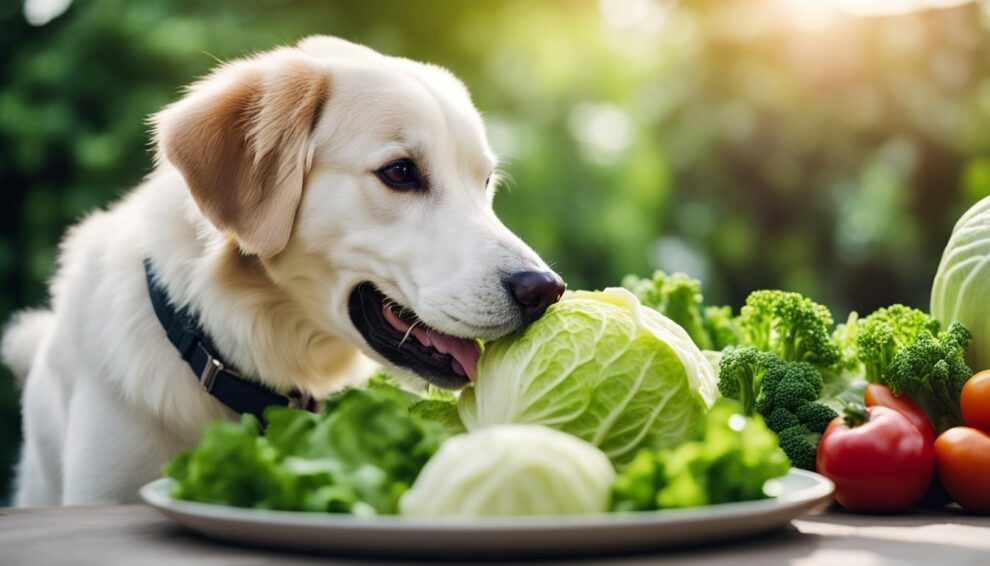When we think about treating our canine companions to something healthy from our kitchen, cabbage may not always come to mind.
Yet this leafy green vegetable can be a nutritious addition to a dog’s diet.
Packed with vitamins and fiber, cabbage offers several health benefits, provided we serve it in moderation.
It’s a low-calorie snack that can aid digestion and is rich in essential nutrients, which makes it a wonderful occasional treat for our dogs.

Ensuring that the food we share with our dogs is safe is paramount, and cabbage checks that box when given properly.
It’s important for us to cook cabbage before sharing it with our furry friends, as this makes it easier for them to digest.
Just like us, dogs can experience gas from eating cabbage, so introducing it slowly and in small amounts is the best way to enjoy the benefits without the discomfort.
We always want what’s best for our pets, and incorporating cabbage into our dog’s menu can support their overall well-being.
When added cautiously, it can give a healthy boost to their regular diet.
So next time we’re chopping up cabbage for our meal, setting aside a small, cooked portion for our dog can be a good way to enrich their diet with something new and beneficial.
Nutritional Profile of Cabbage for Dogs

Before we introduce cabbage to our furry friends, it’s essential to understand what benefits this vegetable holds for them.
Cabbage is packed with essential nutrients that can support your dog’s health in various ways.
Vitamins and Minerals in Cabbage
Cabbage for dogs is a powerhouse of vitamins and minerals that are beneficial for their overall well-being.
It’s particularly rich in vitamin K, which is critical for healthy blood clotting.
Also, vitamin C serves as an antioxidant, helping to reduce inflammation and boost the immune system.
As for minerals, cabbage contains manganese, which plays a role in bone formation and blood clotting, and copper, essential for forming red blood cells.
- Vitamin C: Antioxidant properties, supports immune health.
- Vitamin K: Integral for blood coagulation.
- Manganese: Aids in bone formation and blood clotting.
- Copper: Important for red blood cell formation.
The Role of Fiber and Antioxidants
Cabbage is also a fantastic source of fiber, which is crucial for maintaining healthy digestive functions.
A moderate amount of cabbage can help regulate your dog’s bowel movements and may assist in preventing digestive issues.
Moreover, the presence of antioxidants in cabbage contributes to the overall health by fighting free radicals, thus potentially reducing the risk of chronic diseases.
- Fiber: Supports digestive health and regular bowel movements.
- Antioxidants: Protect against cellular damage and support overall health.
By including cabbage in our dogs’ diet, we’re not just giving them a tasty treat, but we’re also supporting their health with valuable nutrients.
Health Benefits of Cabbage for Canine Diets

Cabbage is not only a healthy addition to our diets but also a beneficial component in the diets of our dogs.
Incorporating this leafy vegetable can lead to improvements in digestion, skin and fur health, and weight management.
Improving Digestion and Preventing Diseases
Cabbage is a fibrous vegetable that supports healthy digestion for our furry friends.
It can aid in regulating their bowel movements and may help to reduce the risk of digestive disorders.
The high fiber content in cabbage makes it particularly effective in this regard.
Moreover, cabbage boasts anti-inflammatory properties that may benefit dogs with inflammatory bowel disease, and its abundance of antioxidants helps to strengthen their immune system.
Enhancing Skin and Fur Quality
Including cabbage in your dog’s diet can contribute to healthier skin and a shinier coat.
This vegetable is packed with nutrients like vitamins and sulfur, which are known to promote the quality of skin and fur health.
By providing essential nutrients for skin renewal and fur growth, cabbage can be an integral part of a diet for maintaining your dog’s shiny and healthy appearance.
Contribution to Weight Management
As a low-calorie food, cabbage is ideal for dogs that are overweight or need to maintain a healthy weight.
The bulk provided by the leafy greens helps to keep dogs feeling full without adding excessive calories to their diet.
This can be especially helpful for managing our dog’s weight effectively while ensuring they receive ample nutrition.
Potential Risks and Side Effects

When we introduce cabbage to our dogs’ diets, it’s crucial to be aware of a few potential risks and side effects.
While cabbage can be a healthy snack in moderation, certain dogs might experience adverse reactions, particularly if they consume too much.
Gastrointestinal Issues and Excessive Gas
Cabbage belongs to the cruciferous vegetable family, which is notorious for causing gastrointestinal issues in some dogs.
If our canine companions eat cabbage, especially in large quantities or in its raw form, they might suffer from bloating, upset stomach, or diarrhea.
This is due to the high fiber content, which can be tough on their digestive system, leading to excessive gas and flatulence.
Impact on the Thyroid Gland
While less common, there’s still a need for us to be cautious about cabbage’s impact on our dogs’ thyroid gland.
Compounds like thiocyanate in cabbage can potentially interfere with thyroid function, contributing to hypothyroidism when consumed in high quantities.
It’s essential to monitor the amount of cabbage our dogs eat, to ensure their thyroid health remains unaffected.
Concerns with Certain Compounds in Vegetables
Finally, it’s important to point out that not all vegetables are safe for dogs, and some, like garlic and onions, can be toxic.
While cabbage itself is not toxic, it is still rich in thiocyanate.
Also, just like with humans, some dogs might be more sensitive to these compounds, leading to stomach upset and even bloat, which is a serious condition.
To minimize risks, always cook cabbage before feeding it to our dogs and serve it in moderation.
Feeding Your Dog Cabbage Safely

Before we introduce cabbage to our canine companions, it’s crucial we prepare it safely and serve it in moderation.
By taking the right steps, we can provide our dogs with the healthy benefits of this vegetable without causing any dietary upset.
How to Properly Cook Cabbage for Dogs
To ensure your dog can digest cabbage easily, the vegetable should be thoroughly washed to remove any dirt and potential pesticides.
After washing, remove the tough stem and core, as these parts can be difficult for dogs to chew and digest.
It’s best to steam or boil cabbage without adding any seasonings or spices, which can be harmful to dogs.
- Cooked Cabbage:
- Wash cabbage thoroughly.
- Remove stem and core.
- Steam or boil the cabbage.
- Chop into bite-sized pieces after cooling.
- Serve plain: no seasonings or spices.
Steaming or boiling makes the cabbage easy to chew and digest, while also preserving most of the nutrients.
Cut the cabbage into small, bite-sized pieces to prevent choking and make it simple for your dog to eat.
The Importance of Moderation and Variety
Cabbage is safe and can be a healthy addition to your dog’s diet, but moderation is key.
Introduce cabbage slowly and ensure it’s only a small part of your dog’s overall diet, which should be well-rounded with other safe vegetables and fruits.
Dogs enjoy variety, and you might also consider including other safe vegetables like lettuce, bell peppers, peas, and zucchini.
- In Moderation:
- Small portions of cooked cabbage.
- Gradually introduce cabbage to their diet.
- Mix with other safe vegetables and fruits.
Remember, while cabbage is healthy, too much can lead to gas and an upset stomach.
By mixing in variety like tomatoes and mushrooms, always in safe quantities, you can enhance your dog’s diet with a range of nutrients.
Always exclude any vegetables known to be harmful to dogs, and when in doubt, consult your veterinarian.
Consulting With a Veterinarian
Before we introduce cabbage into our dog’s diet, it’s essential that we have a chat with our veterinarian.
This friendly professional is equipped not only with the knowledge of how various foods can affect our furry friend’s health but also with specific insights about our dog’s individual needs.
Here are a few reasons why we should consult with a veterinarian:
- Health Check: The vet can ensure that our dog is in good health and that adding cabbage to their diet wouldn’t interfere with any existing conditions, particularly those related to the thyroid gland, as cabbage contains goitrogens which can affect its function.
- Amount and Preparation: Our vet can advise on the appropriate amount of cabbage to feed our dog.
They may recommend starting with small quantities and observing how our dog reacts before making it a regular part of their diet.
- Potential Risks: While cabbage can be a healthy addition, it’s not without its risks.
A vet can inform us about any signs of gastrointestinal upset to look out for.
It’s crucial that we remember:
- Each Dog is Unique: Our vet will consider our dog’s unique health profile, including age, weight, and pre-existing conditions.
- Safety First: We want to avoid any potential adverse reactions, and our trusted vet can guide us on the safest way to feed cabbage to our dog, cooked or raw, and without any harmful seasonings.
By consulting with a veterinarian, we can feel confident about making informed decisions that contribute to our dog’s well-being, keeping them happy and healthy.















